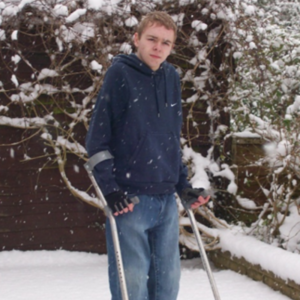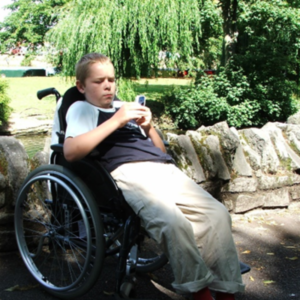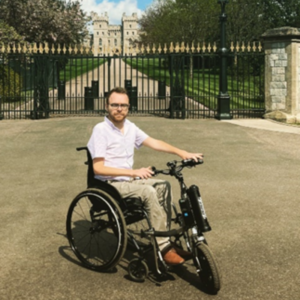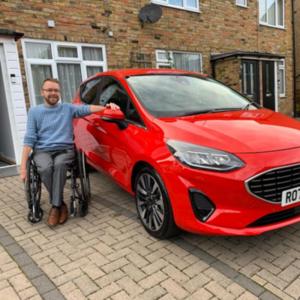My Experience with SMA
My Experience with SMA
My name is Steven, I am 30 years old and I have SMA Type 3.
Diagnosis
Despite the neatly defined clinical types, the severity of the condition varies from person to person and everyone is affected differently. I was diagnosed with SMA when I was five years old. My parents noticed I was walking slightly differently to others and following several checks, including genetic investigations, received a formal diagnosis. They recall a time at the hospital when a member of staff said “if you have to have a disability, this is the one to have” which is reassuring in some ways and opens your eyes to how much research is happening in the field as well as the considerable amount of other, more severe, conditions there are out there.
varies from person to person and everyone is affected differently. I was diagnosed with SMA when I was five years old. My parents noticed I was walking slightly differently to others and following several checks, including genetic investigations, received a formal diagnosis. They recall a time at the hospital when a member of staff said “if you have to have a disability, this is the one to have” which is reassuring in some ways and opens your eyes to how much research is happening in the field as well as the considerable amount of other, more severe, conditions there are out there.
Growing up
I went to a mainstream school and started to use crutches to help me walk when I was 10 years old. I did lots of physio and hydrotherapy which helped maintain and build the stamina of my muscles. In secondary school, I started to use a wheelchair mostly due to the size of the school. My ability to walk reduced over time as I was growing and my muscles couldn’t keep up however, this wasn’t that noticeable as I was naturally using the wheelchair more because of my environment. I had good experiences at both my primary and secondary school, with extra support provided where needed. There was an overall lack of understanding from the teachers of my disability with some thinking that I should be able to fully participate in PE lessons (including football!) as I could walk a bit and others thinking I needed help writing because I was disabled. The physical environment of the school was positive with step free access and lifts in the majority of the buildings. The school had even invested in sports wheelchairs allowing everyone, disabled or not, to experience wheelchair basketball. At the age of 16 I was using the wheelchair full-time and also learning to drive. Amazingly in this country if you have a disability you can learn to drive at 16 instead of 17. This was a great experience and gave me a lot more freedom as I couldn’t hop on a bus or train like others were doing at my age.
walk when I was 10 years old. I did lots of physio and hydrotherapy which helped maintain and build the stamina of my muscles. In secondary school, I started to use a wheelchair mostly due to the size of the school. My ability to walk reduced over time as I was growing and my muscles couldn’t keep up however, this wasn’t that noticeable as I was naturally using the wheelchair more because of my environment. I had good experiences at both my primary and secondary school, with extra support provided where needed. There was an overall lack of understanding from the teachers of my disability with some thinking that I should be able to fully participate in PE lessons (including football!) as I could walk a bit and others thinking I needed help writing because I was disabled. The physical environment of the school was positive with step free access and lifts in the majority of the buildings. The school had even invested in sports wheelchairs allowing everyone, disabled or not, to experience wheelchair basketball. At the age of 16 I was using the wheelchair full-time and also learning to drive. Amazingly in this country if you have a disability you can learn to drive at 16 instead of 17. This was a great experience and gave me a lot more freedom as I couldn’t hop on a bus or train like others were doing at my age.
University
Before I went to university, I had an assessment for Disabled Students’ Allowance (DSA) and was granted funding to cover the difference in the cheapest non-accessible university halls and cheapest accessible university halls and a variety of other disability related measures. This really helped to make my university experience fairer and more affordable as having a disability can be expensive (on average a disabled person’s extra costs because of their disability are a shocking £583 a month!). I was able to take my car, stay in accessible halls for all three years of study and the campus and bus service was fully accessible. At university I took a year out and completed an industrial placement with Hays Recruitment and was successful for the Motability Operations Scholarship scheme which provided funding towards my degree and two internship opportunities in their Bristol and London offices.
Allowance (DSA) and was granted funding to cover the difference in the cheapest non-accessible university halls and cheapest accessible university halls and a variety of other disability related measures. This really helped to make my university experience fairer and more affordable as having a disability can be expensive (on average a disabled person’s extra costs because of their disability are a shocking £583 a month!). I was able to take my car, stay in accessible halls for all three years of study and the campus and bus service was fully accessible. At university I took a year out and completed an industrial placement with Hays Recruitment and was successful for the Motability Operations Scholarship scheme which provided funding towards my degree and two internship opportunities in their Bristol and London offices.
Career
Shortly after graduating I joined the Civil Service and recently reached my 6-year Civil Service anniversary. I’ve done a range of exciting and challenging roles in EU Exit and more recently COVID response and have been able to gain access to lots of learning and development opportunities and promotions. At first I didn’t think working in London would be accessible, however by the departments providing me with a parking space as a reasonable adjustment, I was able to. The Civil Service offers flexible and hybrid working and Disability Adjustment Leave (which I had never heard of!), an amount of paid time off for disability related matters. The Civil Service isn’t perfect but there are lots of measures in place with a strong culture and emphasis on diversity and inclusion.
my 6-year Civil Service anniversary. I’ve done a range of exciting and challenging roles in EU Exit and more recently COVID response and have been able to gain access to lots of learning and development opportunities and promotions. At first I didn’t think working in London would be accessible, however by the departments providing me with a parking space as a reasonable adjustment, I was able to. The Civil Service offers flexible and hybrid working and Disability Adjustment Leave (which I had never heard of!), an amount of paid time off for disability related matters. The Civil Service isn’t perfect but there are lots of measures in place with a strong culture and emphasis on diversity and inclusion.
Home
I moved into my own house in 2017. I viewed around 10 properties, all of which were not accessible and I would have had to make significant adaptions. I was in the fortunate position that my dad had recently retired and had a lot of spare time on his hands. I bought a “fixer upper” which hadn’t been lived in for years. I had a new driveway installed and a drop kerb, a wall removed to make it open plan, new kitchen (with a reduced height hob), new bathroom and wooden floors installed throughout. This was all privately funded. I enquired about potential funding but this would have taken a minimum of six months for my application to go through and, of course, would not be guaranteed.
Perception
From my experience, views on disability can often be based on one or two experiences individuals have had in their lifetime. People often make the assumption about me that I have really strong arms because I self-propel my wheelchair and maybe because of the Paralympians we all see on TV. This, of course, is not the case as I have muscle weakness throughout my body. Disability equating to unemployment or a benefit receipt is another common misconception, alongside people with disabilities not being as bright as everyone else.
Summary
Often with disability it’s easy to focus on what you can’t do rather than what you can – I means it’s in the name! My disability has made me organised, more resilient and flexible and motivated to succeed and break down perceptions and societal barriers. If you have a disability or a long-term health condition or even been unwell for a certain period of time, what have you learned from this? What skills and invaluable experiences have you gained?
what you can – I means it’s in the name! My disability has made me organised, more resilient and flexible and motivated to succeed and break down perceptions and societal barriers. If you have a disability or a long-term health condition or even been unwell for a certain period of time, what have you learned from this? What skills and invaluable experiences have you gained?
